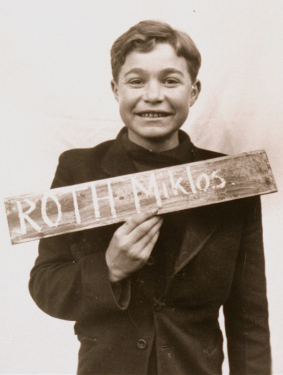Remembering the Victims of the Holocaust … and Those Who Survived

Michael "Miklos" Roth and other children orphaned by the war had their photographs published in newspapers in hopes of reuniting them with any surviving family.
Michael Roth, a professional in retail management and real estate, wasn't always known as Michael. He was born Miklos Roth in 1931 in the small farming community of Semjén, Hungary.
In April 1944, at the beginning of the Nazi occupation of Hungary during World War II, Michael and his family were removed from their home and relocated to a Jewish Ghetto before being transported by cattle car to Auschwitz concentration camp. Upon arrival at Auschwitz, Michael, along with his mother, father and three siblings were subjected to a selective process. A young Polish girl, tasked with collecting the personal belongings of the people arriving at Auschwitz, advised Michael that when asked his age, to state he was 15 years old (even though he had just turned 13). Michael did as she suggested and, as a result, was sent to the same line as his father. They had been selected to work as slave laborers. His mother, sister and two younger brothers were sent to another line, and Michael never saw them again. He later learned that the four of them were immediately murdered. If he had stated his true age, he would have been sent with them. (Boys under 15 were deemed as unfit for labor.)
Michael and his father remained at Auschwitz for only a few days, before being taken to Gross-Rosen concentration camp, near the border of occupied Poland. For the next nine months, they were slave laborers, working in the forest and building barracks. By that point in the war, Allied forces were advancing against the German lines, and all of the members of the prison camp deemed able were forced to walk toward Dresden, Germany, and on to the Buchenwald concentration camp.
During the forced walk of more than 250 miles, after his father's leg stiffened up, Michael, who had only recently passed his 14th birthday, began carrying him. A German soldier pushed Michael's father off his back and then shot and killed him. Fifteen hundred prisoners began the march. Only 170 survived it. Not long after Michael and the other survivors marched into the Flossenbürg-Zeitzeugen concentration camp, others were marching toward the camp, as well: American forces.
Fleeing the oncoming Americans, the Nazis abandoned the camp, leaving the prisoners behind. On April 23, 1945, American forces liberated Flossenbürg-Zeitzeugen. By that time, Michael was extremely sick from dysentery. Having no access to food for the previous 10 days, he resorted to eating grass. Michael was taken to a field hospital run by the U.S. military and remained there for four months, regaining his health. In August 1945, Michael went to a displaced person's camp in Kloster Indersdorf, Germany, set up for the care of hundreds of children left homeless and orphaned by the war. Michael, like the other children at the camp, posed for a photo holding a name card. The photos were published in newspapers in hopes of reuniting the children with any surviving family. The photo of "Miklos Roth," despite the horrors he lived through in the preceding years, depicts a smiling, healthy teenager and stands as a testament to resiliency of the human spirit.
After nine months of living with the other orphans, some of which he kept in touch with for the rest of his life, Michael boarded a United States transport to be reunited with his aunt who had fled Hungary a decade earlier and lived in the Bronx, New York. He arrived in America on May 22, 1946.
Michael went on to complete high school and college, and he served in the U.S. Marine Corps during the Korean War. He worked in the retail sector for more than 30 years, and then spent his later years working in commercial real estate. His family, including his cousin Brett Messinger, a Duane Morris partner, remembers Michael as a wonderful man who was generous, warm-hearted, self-reliant and resilient.
Upon Michael's passing in 2011, Duane Morris helped his estate bequeath a half-million-dollar contribution to the United States Holocaust Memorial Museum.
For more information from the U.S. Holocaust Memorial Museum, see the following:
- The Liberation of the Concentration Camps
- The Holocaust Survivors and Victims Resource Center
- Children During the Holocaust
- Do You Remember Me? Miklos Roth
- The Simon-Skjodt Center for the Prevention of Genocide
- U.S. Holocaust Memorial Museum Public Events Calendar
And for a related blog post, see:







